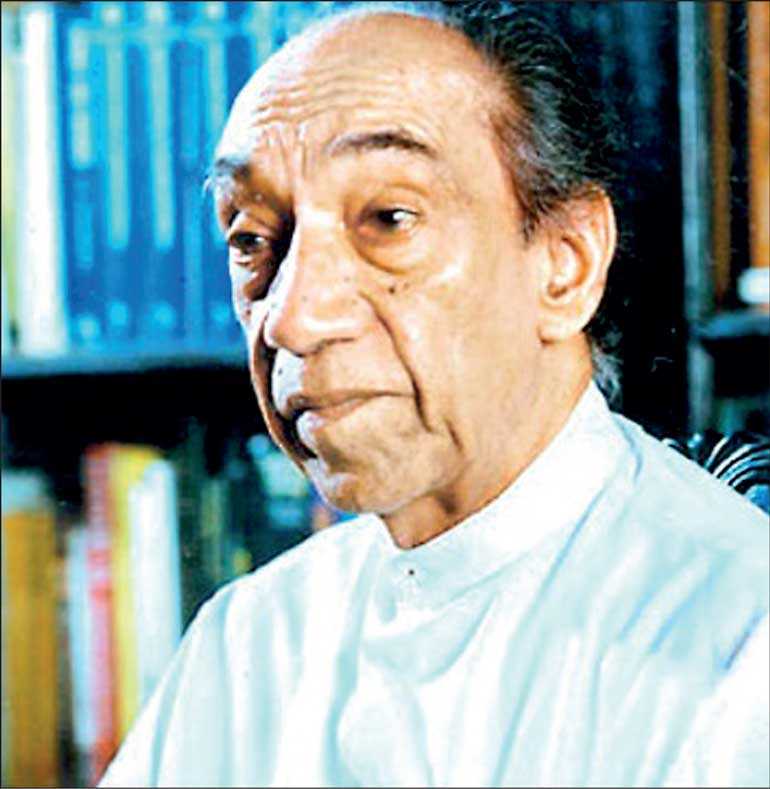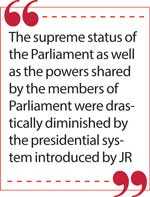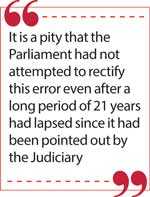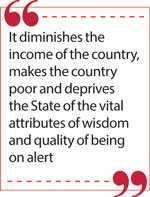Wednesday Feb 25, 2026
Wednesday Feb 25, 2026
Friday, 14 June 2019 00:00 - - {{hitsCtrl.values.hits}}

While the failure to build the modern nation has been the prime factor that had caused the wretchedness of Sri Lanka, plundering of public property by rulers when they are under their custody can be considered the next vital factor that had exacerbated this situation. 
I have briefly discussed the issue on the failure to build the modern nation in a previous article. In this article, I intend dealing with the question on plundering of public property by ruling parties.
Under a democratic system, the property belonging to the State constitutes public assets collectively owned by all citizens of the country. The ruling parties elected by the people from time to time are only the temporary custodians of public property. It is one of the main responsibilities of the custodians of public property to safeguard them and keep the income generated from them at an optimal level.
Strict laws preventing public property being misappropriated by their custodians or allowing those to be misused by their kith, kin and cronies are in force in all countries where there is a democratic system of governance. The acquisition or plunder of public property by the ruling party or party members or appropriating them to a third party or to their cronies are considered a disgusting and serious offence punishable by law.
Plunder of public property
But, in Sri Lanka, this acknowledged principle on the ownership of public property was operative only up to 1977. Since then, it can be said, that the misuse and plundering of public property which are under the custody of the rulers of the country has become a widespread national defect, a permanent and salient feature of the State rule.
So much so, this situation has rendered the contest among political parties to acquire the ruling power of the country, an expensive, ugly and fierce struggle for gaining the opportunity to plunder the public property.
This deep-rooted and loathsome practice in the State rule of Sri Lanka has enabled the ruling party to exploit, at their whim and fancy, the public property which comes under their custody during the tenure of their rule.
The ruling parties are engaged freely in plundering public property with impunity and without any sense of fear or shame as the laws that protect and prohibit the misuse of public property by their temporary custodians have been rendered completely defunct and non-operational. 
This practice occurs in different forms. Acquisition of valuable state lands by politicians themselves or appropriating them to their kith and kin and cronies can be considered one form of it.
Similarly, the acquisition of land belonging to the Land Reforms Commission on long-term leases at a nominal price is a popular form in which this process is carried out in the sphere of State lands. Acquirement of prime lands of very high commercial value belonging to various government departments, located closer to major tanks and reservoirs and adjacent to the sea is another form of this abuse.
Taking over the government contracts by themselves or granting them to their family members and cronies can be described as another form of this process. Business licences yielding exorbitantly high income such as radio waves and frequencies, liquor permits, ethanol permits, re-export permits, passenger transportation permits, timber, sand, soil and rubble business permits are common forms of this process.
The acquisition of State enterprises by politicians or conferring them to their family members and cronies on instances when they are divested to the private sector can be described as yet another form of this process.
Establishment of the system
The loss incurred to the country and the State due to plundering of public property by the rulers themselves, who had steered the country for a very long period of over 42 years without any restriction or challenge, can amount to many billions of rupees. It can be reckoned to be a major factor that had caused the present level of bankruptcy that the country is facing. 
This situation has invariably resulted in depriving the legal and ethical legitimacy of the people’s representatives viz the presidents, ministers and the members of Parliament, elected from time to time, by public vote to the Executive and the Legislature and making them a group of chartered plunderers of public property.
Moreover, this situation has resulted in debilitating the rule of law, weakening the efficiency of the institutional system which had been established and maintained by public money to restrain corruption. In short, this scenario has rendered the entire State and its institutional system a sordid entity of rampant corruption.
This corrupt and wicked system is not a mere outcome of an accident or a spontaneous process. It can be described as a system introduced deliberately and consciously by late President J.R. Jayewardene and pursued throughout the long period of his rule. It has now been firmly rooted as an essential element in the political culture of the country.
Despite the fact that there were many defects and shortcomings of the rulers who were JR’s predecessors, none of them had attempted to implant and establish such a wicked and destructive system similar to this. But, all the other rulers who succeeded J.R. Jayewardene had further reinforced and intensified this corrupt system by adding more and more new elements into it.
Perhaps JR might have learnt this system from emperor Napoleon. Napoleon was his ideal hero. Napoleon was a leader who built an enormous empire employing a massive mercenary army. To sustain militant spirit of the mercenaries, Napoleon allowed them to plunder the cities captured by them. Similarly, the policy adopted by Napoleon for war, J.R. Jayewardene applied for his politics.
The supreme status of the Parliament as well as the powers shared by the members of Parliament were drastically diminished by the presidential system introduced by JR. The position of the parliamentarians was reduced to a level of a rubber stamp in the hands of the president. 
In this backdrop, it can be construed that JR had introduced this corrupt system, allowing the MPs of the ruling party to amass wealth in undue and unlawful means, with a view to overcome their dissatisfaction and getting them to extend their unconditional support to him throughout the long term rule that he envisaged to maintain.
Role of JR
JR went to the extent of setting extremely ugly and lowly examples in order to persuade the MPs of the ruling party to abide by the wicked and predatory system that he introduced.
He exchanged an unproductive coconut land at Madampe which was owned by him and his family members for a flourishing coconut land at Nattandiya (Keenakale Watta) belonged to the Land Reforms Commission. By any standard this infamous deal was a lowly act, contrary to the law which cannot be desired from any leader or the head of State, the leading symbol of the nation.
With this example set by JR, a large number of ministers and MPs of the ruling party were able to become landed proprietors and planters by appropriating valuable lands of the Land Reforms Commission on long-term lease at a nominal price.
Thus, by allowing the president, the ministers and MPs to acquire public lands, they and their family members were able to acquire valuable lands belonged to the Government, together with the buildings stood on them including the estate bungalows, in large scale and at a nominal price.
At the same time, the MPs of the ruling party were allowed to become government contractors and license holders and amass wealth from them and become rich. J.R. Jayewardene was fully aware that this dishonest practice was contrary to the law of the country.
Yet, his intention was to make the MPs of the ruling party a contented and happy lot who are rich and driven by the desire to amass wealth and retain their political power by hook or crook, no matter how.
It was when this system of pillaging public property introduced by JR was in progress that Albert Silva, the MP elected to the Galle constituency at the General Election in 1977, was deprived of his parliamentary seat by a court decision on the grounds that he had held a kerosene permit issued by the Government. This decision can be considered an instance that had demonstrated the illegality of the scheme introduced by President Jayewardene.
Yet, what was the response of former President Jayewardene to this decision? Instead of withdrawing his policy which allowed the MPs to transact business with the Government respecting the decision of the judiciary, he reappointed Albert Silva to the Kamburupitiya electorate as a nominated MP.
It was during September 1979 that the Judiciary deprived Albert Silva of his parliamentary seat. He was appointed the MP for Kamburupitiya electorate in November of the same year.
Deceptive underarm play
Undoubtedly, J.R. Jayewardene might have imagined that any issue arising from the illegal and exploitative system that he pursued could be suppressed by using the presidential immunity that he enjoyed, according to which the President during his tenure of office was absolutely immune from legal proceedings in his official or private capacity.
In addition to using the presidential immunity for his own protection, JR had the capacity to protect his favourite henchmen as well who had committed offences, by using his immunity.
Despite his keenness and interest in persuading the people’s representatives elected by public vote to misappropriate public property he had the audacity to include a clause prohibiting MPs engaging in business transactions, in the 1978 Constitution which was his brainchild, with a view to giving the Constitution a solemn look and creating an image that it is espousing the cause of justice and fair play.
The Constitutional Clause 91 (1) (E) relevant to this prohibition is as follows.
“No person shall be qualified to be elected as a Member of Parliament or to sit and vote in Parliament, if he has any such interest in any such contract made by or on behalf of the State or a public corporation as Parliament shall by law prescribe.”
I wish to draw the attention of the reader to the following section of this clause “as Parliament shall by law prescribe”. This implies that the Parliament should enact specific laws if it is to implement the provisions specified in this clause to disqualify anyone for election as a Member of Parliament.
But, former President Jayewardene didn’t initiate action to enact laws to give effect to this provision. There is no doubt that he may have prevented enacting necessary laws when he had a five-sixth majority in the Parliament, merely because he wanted to safeguard the illegal right he had conferred on the members of the ruling party to exploit public property.
This ugly and improper situation came to light only after 20 years of the enactment of the ‘78 constitution when the case against Rajitha Senaratne was taken up at the courts in 1998, in which he was unseated for doing business with the State while being an MP.
The case of Rajitha Senaratne
By this time, a large number of parliamentarians had become large scale business dealers transacting various kinds of unlawful businesses with the Government. But, legal action had been initiated only against Rajitha Senaratne.
It was proved that the company that belonged to Rajitha Senaratne had entered into an agreement with the Government to supply dental surgical appliances to the Sri Lanka Navy, the Air Force, the Department of Health and State Pharmaceutical Corporation.
However, as there were no specific laws enacted in keeping with the provisions of the 1978 Constitution to deal with the MPs committing such offences, in this case Rajitha Senaratne was found guilty and was punished under the Soulbury Constitution. He was unseated by the panel of judges who heard the case.
The judgment of this case had highlighted that it was a serious matter difficult to understand as to how such a strong tradition that had been in operation to safeguard the integrity and sanctity of public life of people’s representatives had been totally ignored.
This can be construed as a serious allegation made by the Judiciary against the Parliament for not enacting laws in reference to the implicit requirements of Clause 91(4) E of the 1978 Constitution.
The next surprising thing was the reappointment of Rajitha Senaratne as a national list member to the Parliament by Ranil Wickremesinghe following the precedent created by the J.R. Jayewardene regime. In doing so, not only had he justified and consolidated the shameful tradition that allowed people’s representatives to plunder public property, but also issued a strong signal that he would not allow to change this despicable tradition.
An important lesson on the corrupt nature of the Parliament can be learnt from this judgement. Until this judgment was passed the Parliament had refrained from enacting laws essential for maintaining the integrity and sanctity of the people’s representatives in the Parliament.
It is a pity that the Parliament had not attempted to rectify this error even after a long period of 21 years had lapsed since it had been pointed out by the Judiciary. Doesn’t it imply that the Legislature, the main law-making body of the country is not willing to change the corrupt and exploitative character of the legislators themselves?
In consequence of this situation, a majority of parliamentarians had become businessmen transacting business with the Government. Some of them had purchased government lands and had become planters.
How large is the number of MPs having houses and hotels in the vicinity of major tanks of the country? Aren’t these lands belonged to the State? How many of parliamentarians do who work as government contractors? How many of them are holding tavern licences, licenses for rubble, sand, soil and timber business, having re-exportation permits, etc.?
Can the MPs who fall into this category be treated as qualified to sit and vote in Parliament in terms of the law applicable to them? How can the Parliament of Sri Lanka be considered a legally and morally legitimate institution, if the majority of parliamentarians fall into this category? Hasn’t the Speaker of the Parliament a responsibility to investigate into this situation? Hasn’t the Auditor General a duty to investigate into this situation?
This situation can be reckoned to be the worst defect of the State rule of Sri Lanka. It is unavoidable that a country becomes a hapless chew if those elected to the Executive and the Legislature by the public vote to steer the rule of the State, are inclined to adopt a ruthless policy of pillaging the public property under their custody. That is what exactly had happened to Sri Lanka.
If those who steer the wheel of the State are bent on misusing their power to amass wealth in undue and illegal means, it will invariably lead to weaken the rule of law of the country and render the entire system of public institutions corrupt and inefficient.
It diminishes the income of the country, makes the country poor and deprives the State of the vital attributes of wisdom and quality of being on alert. A team whose main object would be to plunder the public property cannot be expected to possess essential elements of discipline, interest and ability to develop the country except for making it bankrupt.
In view of above, it is important and essential that the priority should be given for the removal of this deadly cancer from our society.